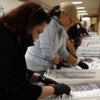A majority of Delawareans support education savings accounts (ESAs), according to a new study released by The Friedman Foundation for Educational Choice.
The study used a randomly selected sample of Delaware voters to measure public opinion on a variety of education-related issues, including the direction of K–12 education, education spending, school choice options, and standardized testing.
It found 50 percent of Delaware voters think that K–12 education is on the “wrong track,” while only 35 percent believe it is headed in the “right direction.” Most notable is the high support for education savings accounts.
The Daily Signal depends on the support of readers like you. Donate now
According to the survey, “[N]early six out of 10 Delawareans (59 percent) said they support an ‘education savings account’ system.” The Friedman Foundation’s national Schooling in America Survey, released in June, yielded similar results, finding that 56 percent of Americans supported ESAs.
Arizona’s ESA Success
First signed into law in Arizona in 2011, ESAs enable parents to fully customize their child’s education with 90 percent of the state per-pupil funding that would have gone to their child in the public school. An ESA works like an education “debit card.” With this debit card, parents can tailor their child’s education to their child’s unique learning needs using a variety of preapproved services and providers, including private tutoring, textbooks, curricula, individual public school courses, online learning, and education therapies. Parents can even roll unused funds into a college savings account.
ESAs have been so successful in Arizona that the program has been expanded three times to include children with special needs, children from underperforming schools, children of active-duty military families, children in foster care, children of fallen soldiers, and incoming kindergarteners.
Florida
Florida became the second state to adopt ESAs in June, called Personal Learning Scholarship Accounts (PLSA) by the Sunshine State. Four months into operation, Florida’s PLSA program has more than 3,000 applicants and has distributed more than 1,000 scholarships.
Could Delaware Be Next?
In June, lawmakers in Delaware proposed an ESA option, the “Parent Empowerment Education Savings Account Act.” Allowable uses of the funds would include private school tuition and fees, textbooks, private tutors, curricula, online learning tuition, Advanced Placement exams, and special needs services and therapies.
“I think parents need to know that there is a way for them to have more control over their child’s education, and right now they don’t have that option,” stated House Minority Whip Deborah Hudson, a sponsor of the proposal.
Delawareans are already looking for alternatives within the public system. According to the Foundation for Excellence in Education senior fellow Matthew Ladner, Delaware’s charter school sector is in demand. “Delaware charter schools have been heading towards a 10 percent [share] of the market as well, and many Delaware charter schools have waiting lists,” writes Ladner.
Friedman’s study suggests that Delawareans—like most Americans— are not happy with the current direction of the K–12 system. They are looking for new options.
A Different Vision
With public education becoming increasingly homogenized—now through efforts to centralize education content by Common Core education standards—school choice represents a different vision of K–12 education. ESAs are the next generation of school choice, creating customizable, student-centered education options for children in Delaware and in any other state that wants to be at the forefront of school choice 2.0.































